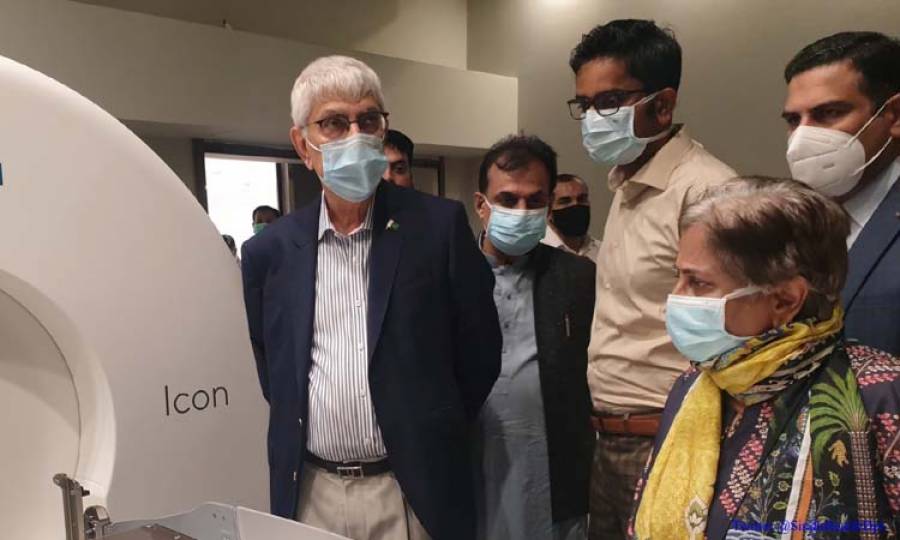Azra declares clinical trial on COVID-19 patients a major success

KARACHI: Dr Azra Fazal Pechuho, Minister for Health and Population Welfare, said the clinical trial at the CBSCR, Dr Panjwani Center for Molecular Medicine and Drug Research, University of Karachi, represents the high level of expertise of Pakistani professionals in the field of clinical research.
She had declared the clinical trial on the efficacy and safety of Jinhua Qinggan Granules (JHQG), conducted at the Center for Bioequivalence Studies and Clinical Research (CBSCR) for the treatment of COVID-19 patients successful and significant for the treatment of COVID-19 patients.
In the public announcement ceremony, she communicated the first-ever successful clinical trial of Chinese medicine 'Jinhua Qinggan Granules' (JHQG) at the International Center for Chemical and Biological Sciences (ICCBS), University of Karachi.
The ceremony was jointly organised by the Sindh Health & Population Welfare Department, COMSTECH, ICCBS - University of Karachi, and many Chinese institutions.
The ceremony was also addressed and attended by Prof Atta-ur-Rahman, Chairman of Prime Minister's Task Force on Science and Technology, Prof Dr Khalid Iraqi, Vice-Chancellor, University of Karachi, Prof Dr M. Iqbal Choudhary, Director of the International Center for Chemical and Biological Sciences, and Coordinator-General, COMSTECH, Excellency Mr Nong Rong, Ambassador of The People's Republic of China in Pakistan and other Chinese officials.
She congratulated the experts involved in the clinical research. She pointed out that Pakistan's capacity to conduct internationally registered clinical trials was a significant step forward in meeting the challenges of the ever-increasing disease burden and preparing the nation for future health predicaments.
She said, "I am also pleased to announce that my ministry has recently set up Sino-Pakistan Traditional Medicine Center at the ICCBS with the help of Rs. One hundred thirty-six million with the objective of close collaboration in research and practice of traditional Chinese medicine for the advantage of people of Sindh."
Prof. Atta-ur-Rahman said, "This is a historic occasion in many ways. Firstly, this is the first-ever clinical trial of Chinese medicine, and secondly, this also owns the international stature."
He accentuated the deep and much broader bilateral relations of Pakistan and China. He said that this close relation on the fronts of science and technology, higher education, and Information Technology were fostered with each passing day. The future of this nation lies in developing a strong knowledge economy, he added.
Prof Khalid Iraqi highlighted the essence of taking prophylactic dimensions in the ongoing pandemic and said that during the last 70 years, China had excelled in the field of traditional medicine. He also stressed the implication of the faculty role in academia and said that ICCBS had played a pivotal role in developing its faculty.
Prof Dr M. Iqbal Choudhary informed the participants that Juxiechang (Beijing) Pharmaceutical Company manufactured Jinhua Qinggan Granules (JHQG). He conveyed the CBSCR at the Dr Panjwani Center was officially declared the centre of the Sindh Health Department to conduct health-related research from the Sindh Government.
He emphasised the fact that expertise in clinical trials is critically vital in indigenous drug discovery and development.
Mr Nong Rong congratulated Pakistani scientists and officials for having successful clinical trials of Chinese medicine expressed that this clinical trial would enrich the bilateral cooperation between China and Pakistan.
Moin ul Haque appreciated the Chinese authorities for assisting Pakistani health experts to overpower the ongoing pandemic. He said, "Pakistan attaches great importance to developing economic and trade ties with China".
Prof Dr M. Raza Shah said that the mandate of CBSCR was to conduct clinical research on TCM-related products. The treatment group showed rapid recovery from symptoms including Cough, Sputum, Sore Throat, Dyspnea, Headache, Nasal Obstruction, and Myalgia after administration of JHQG Granules.
Advertisement
Trending
Popular
Aging: New study identifies key lifestyle, environmental factors ...
-
Hair loss: Discovery uncovers key stem ...
08:00 PM, 25 Feb, 2025 -
Broccoli sprout compound may help lower ...
11:31 AM, 25 Feb, 2025 -
Gas Pain vs. Heart Attack: How to tell ...
09:00 PM, 22 Feb, 2025 -
Coconut oil supplement shows promise ...
08:00 PM, 20 Feb, 2025



